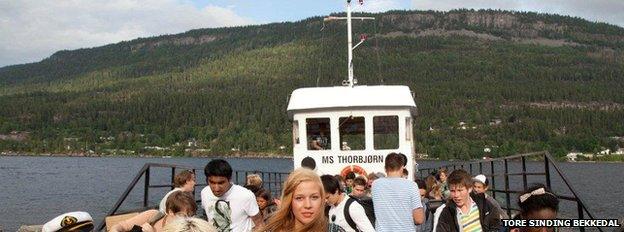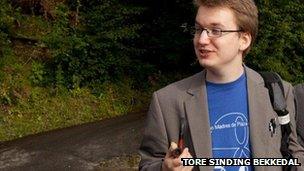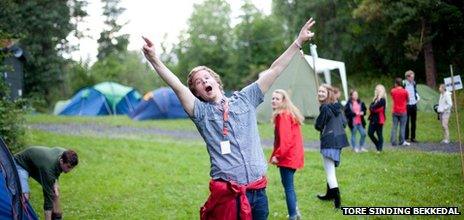Norway attack survivor's need to reclaim massacre island
- Published

One year on from Norway's twin terror attacks which killed 77 people, one survivor from the Utoeya massacre says he wants to return to the island and continue the Labour politics which self-confessed mass killer Anders Breivik claimed he was fighting against.
Tore Sinding Bekkedal, 24, survived the Utoeya massacre by hiding in a toilet cubicle and then a store room.
When he emerged, the sights that met him were unimaginable.
Breivik had shot and killed 67 of Mr Bekkedal's fellow Labour Party youth members.

Tore Sinding Bekkedal was appointed unofficial photographer of the 2011 Utoeya camp
Two others had died fleeing. Many others were seriously wounded.
On Sunday, Mr Bekkedal will be back at Utoeya with other survivors to commemorate those who died on that day one year ago.
"It's so outside any concept that you have that you struggle to find out how to react to it - emotionally, logically, there is no set response," Mr Bekkedal told the BBC.
"If a relative dies, you understand how that works and there's a grieving process.
"But what do you do when suddenly a whole chunk of your social circle is taken away?"
Good memories
Today, Mr Bekkedal works as a computer engineer with Norway's national broadcaster NRK, and still enjoys spending time working with the Labour youth organisation.
Yet the past twelve months have been anything but easy.
"The last year has been basically a struggle to get back to where I was, in terms of having a job, and all that kind of stuff," he said.
"The physical reactions started dying down about four or five months in.
"I got my concentration and memory back about eight or nine months afterwards.
"So now I can get back to doing my job, and not just surviving but living a life. It's been an incredible test."
Another way Mr Bekkedal has dealt with what happened is through photography.
He was designated the 2011 Utoeya camp's unofficial photographer, and took thousands of pictures before the terror began.
"I tend to enjoy taking pictures that capture a mood or a situation," he said.
Most of his photographs from the island last year show young people full of life.
He chose to publish some of the pictures in Norway, and also agreed for the BBC to publish some of them here.

Tore Sinding Bekkedal wants to remind people about Utoeya's good times
For him it has been a way of reminding people of what Utoeya and the summer camp has been about for many years - not terror, but youthful enthusiasm and happiness.
"It was a good way to see the good memories, the ones that we want to think about from the people we lost," Mr Bekkedal said.
"But at the same time there's an extraordinary bitterness about not getting any more moments with the same people.
"So it was a tremendously difficult job going through the pictures."
'Islamophobia is still there'
Late in the evening on 22 July 2011, Norway's Prime Minister Jens Stoltenberg said people should answer the attack on their country's democracy not with anger, but with more democracy and more openness.
Mr Bekkedal feels the Norwegian people to a large degree have stood that test.
"The most heartening result for me was the increases not only in the membership of my own party, but all the parties and especially in the youth organisations," he said.
"Meetings which would usually have five or six people - there are now 30, and we have to find bigger rooms.
"That's an absolutely wonderful feeling and it gives me great hope for the future.
"But of course the Islamophobia is still there. These people still have these beliefs, but to a greater extent people get angry, people respond."
The Labour youth movement has maintained all along it wishes to return to Utoeya where it has staged summer camps since the 1950s.
Many of today's senior Labour politicians spent summers there in their youth, including the current prime minister.
Mr Bekkedal feels it is important to "take the island back" by continuing to use it as a venue for political summer camps.
"Utoeya was attacked because it was a threat, and the proper response to an attack like that is to maintain and try to increase that threat to people like him [Breivik]," said Mr Bekkedal.
"There are some people who want to take it slow, but I am way over on the other end of the scale. I'll pitch a tent there as soon as practically possible."
Yet on the first anniversary there will be no tents, and none of the customary laughter and happiness which Labour youth members had come to associate with the island before last year's attack.
Instead there will be speeches by the prime minister and other senior politicians, and time for quiet reflection for the bereaved and survivors.
"I'm starting the day by visiting the grave of one of my friends with a few of my other friends," said Mr Bekkedal.
"From there we will go to the ceremony at Utoeya.
"A ceremony in cases like this is appropriate I believe, and it's going to be an emotional moment I'm sure.
"But it will be nice to be back on the island."